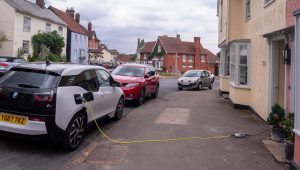Using government policy to improve safety and push society toward a more sustainable future with a lower environmental impact are highly commendable. However, policy has to be rooted in the possible, there is no point creating a fantasy policy to grab headlines and make short term political gains – when it’s just not practical.
 The government announced today that it will ban the sale of all internal combustion engine cars, including hybrids by 2035. So, within 15 years we are to build an entire infrastructure for passenger vehicles – including the power sources for the electricity and the charging points so all new car owners can be electric only… really?
The government announced today that it will ban the sale of all internal combustion engine cars, including hybrids by 2035. So, within 15 years we are to build an entire infrastructure for passenger vehicles – including the power sources for the electricity and the charging points so all new car owners can be electric only… really?
This from a government that still has not enacted legislation that requires replacement exhaust systems to be type-approved – as it is in the rest of Europe, allowing pollution to continue to increase due to the fitting of low quality non-compliant components. Something Klarius has campaigned about over many years.
The announcement is ahead of the 2020 United Nations Climate Change Conference, (or COP26 for short), which is to be held in Glasgow in November this year; while the presidency is held by the UK government.
So, what is the reality?
Problem #1 – parking
The government published its own figures for parking provision1 a couple of years ago, it states that 32% of dwellings relied on street parking, and 2% of homes had no parking provision whatsoever. So, there’s 34% of the population who will need to charge their cars at work or sit around at charging stations during a commute. This includes 73% of local authority dwellings that relied on street parking compared with 20% of owner-occupied homes.
Problem #2 – infrastructure & power generation
Even if everyone could charge their vehicle at home, which is clearly a fantasy, the National Grid’s own predictions for power requirements, versus the UK’s policy and plans for building new power stations mean the country would become increasingly reliant on imported electricity. This would rise from ~10% of total electricity usage to over 30% which raises serious energy security concerns.2 Then we would need the physical infrastructure upgrades to handle the additional load on the national grid.
Problem #3 – public transport
So, we enter a period of the re-birth of clean efficient public transport that is fast and convenient for all to use. How much would that cost exactly, and who would pay for it? The government? No, another fantasy. To move the majority of journeys from private transport to shared, public or communal transport in that time frame would also require a shift in cultural norms so huge, you would need a commitment by successive governments and overwhelming public support, which is absolutely not going to happen.
Problem #4 – other vehicles
On the subject of other vehicles, there is already a major issue with pollution from busses, trains, off highway equipment, emergency power and marine engines. Euro6 compliant passenger vehicles are very clean – unlike your average train. Will all those power sources be swapped over to electricity only? Clearly not, the technology does not work that well yet. Power density for batteries alone is not practical. Many of these sources are there to stand-in for an absence of a practical electrical power supply, or a drop in grid supply.
Problem #5 – purchase cost & jobs
Has anyone checked the price and availability of the rare earth metals used to create the motors and batteries used in EVs, no surprise, they are rising. So, your average EV city car purchase is still going to be two or three times more expensive than a liquid fuelled car, which just isn’t practical unless the government has a plan for doubling everyone’s salary at the same time.
The reality is that the government should consult with the automotive industry, and the aftermarket, including our training resources – and society in general before making impractical policy statements on banning petrol and diesel fuelled cars. There needs to be a sensible transition plan that protects jobs and people’s freedom of choice as well as improving sustainability and lowering pollution.
1 July 2012. Department for Communities and Local Government. English Housing Survey: HOMES Annual report on England’s housing stock. https://assets.publishing.service.gov.uk/government/uploads/system/uploads/attachment_data/file/6748/2173483.pdf
2 Report in The Telegraph in 2017 when Michael Gove announced a 2040 date for the ban to come into effect: https://www.telegraph.co.uk/news/2017/07/25/new-diesel-petrol-cars-banned-uk-roads-2040-government-unveils/









